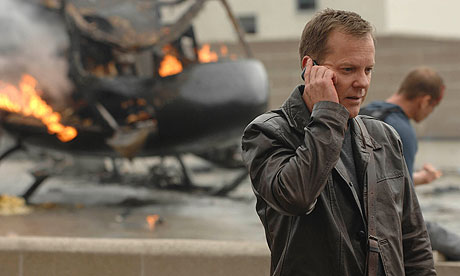Jack Bauer Reminded Us Truth Matters
24 was not an advert for American values, but Bauer showed us real justice is contingent on satisfying our instinct for trutth

The TV drama 24 has concluded. The hero survived. Justice was served. Right triumphed. Is that the raw sum of this thrilling, nine-year narrative: a modern-day fable on the evergreen tussle between good and bad, right and wrong? In part, yes. 24 was a semi-allegorical take on some of the defining political issues of our time – part allegorical because its indestructible protagonist is surely as much metaphorical as he is literal.
You didn't watch it? You have a treat in store. A former US president is exposed as a mendacious manipulator of the recently elected incumbent, who abandons her principles in support of a fraudulent Middle East peace treaty. The toxicity of lies, of deceit, of the outrageous acceptance of "collateral damage" leaches America's body politic, and renders it prostrate, impoverished, and finally impotent. Series eight may have exhausted the generic plot ("cavalier agent of law goes out on a limb to defeat ideological fanatics intent on indiscriminate slaughter"), but the subtleties were laudable and helped hurdle the European viewer's default cynicism.
Let's make this point crystal: 24 is not an advert for American values. Its underlying message straddles the fault lines of politics, of ideology, and of religious faith in order to engage the moral pulse that beats within us. 24 luxuriates in a commonsense notion of right, personified in the ruthless yet strangely appealing character of Jack Bauer. Bauer doesn't bother with legal niceties. He circumvents the law with impunity. "I am judge and jury," he declaims during the last hour of this riveting drama. Yet – and herein lies the essence of the series – his actions are presented as some kind of visceral homage to morality, his sense of justice as a universal one.
In the series finale, Bauer's relentless pursuit of justice reaches fever pitch. He summarily tortures and murders his enemies. Others – not least the US president – yield and crumble beneath the weight of his claim on moral rectitude. What conclusions do his actions portend? That torture is acceptable? That in our mad world of realpolitik, the ends justify the means? That culpability exculpates the purveyor of retribution? Bauer's actions portend none of these things. They demonstrate something deeper: that real justice is contingent on us satisfying our instinct for truth. Bauer reminds us that for all the complexity of circumstances, truth matters. It matters that it be told and upheld. Not just a version of it but plain vanilla truth, neither distorted nor varnished.
There is a truth antenna in us all that confounds relativism. Cognitive scientists have even identified a neural basis for moral reasoning. Ideas and ideologies that conflict with it – weak boilerplate ones like religious belief systems or totalitarianism – are required to circumvent this instinct by ringfencing the doctrines that support them. Apostates are threatened or punished. Criticism is discouraged, dissidents sometimes silenced. The rights of innocents are often forfeited in the name of dogma.
But Bauer has to contend with none of the oppressive, illiberal apparatus of ideas. His actions are wholly in defence of strong values, which are strong by dint of their timeless universality, and unsullied by appeals to context, culture, or creed. They are those of a community that seeks and upholds truth, not a manufactured solidarity. An unflinching prosecution of humanity's predisposition to distinguish between better and lesser morality is Bauer's raison d'être. And it is not because it defines the US politically that these values are upheld. It is because these values are upheld that America is politically defined.
As Benson and Stangroom write:
"There is certainly no guarantee that the truth of the matter will be what one wants to hear, but the only alternative to trying to get at the truth is simply allowing exculpatory fictions to flourish."
This is why Bauer, for all his grotesque shenanigans, takes the viewer with him. Not because he represents the American way, but because he represents the instinctively better way. It's an authentic, guttural thing. The alternative is not a truth that can emancipate us. On the contrary, it saps the human spirit's craving for justice: that metronomic house of right that, in a sense, Jack built.



No comments:
Post a Comment
Note: Only a member of this blog may post a comment.